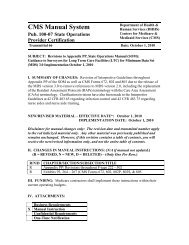LOUISIANA Community Mental Health Services Block Grant ...
LOUISIANA Community Mental Health Services Block Grant ...
LOUISIANA Community Mental Health Services Block Grant ...
Create successful ePaper yourself
Turn your PDF publications into a flip-book with our unique Google optimized e-Paper software.
assessment and treatment services for mental health related issues. The BEST Program also has<br />
provided citizens with a swift support service response that often prevents emotional crises from<br />
escalating, while often negating the need for hospitalization. BEST accepts referrals from recovery<br />
organizations, community centers, public health clinics and the private sector.<br />
The program uses a team approach, using dyads consisting of a master‟s level Crisis Counselor,<br />
specializing in social work or counseling, and a paraprofessional Resource Linkage Coordinator.<br />
Together these dyads provide immediate crisis intervention support and resource information; with<br />
a focus on empowering the client to regain control of their life, develop self-help skills to manage<br />
future crises, and avoid disruptive and costly hospitalization. All of the services provided by the<br />
Access team take place in the client‟s home or in a community-based location.<br />
The BEST (and previously ACCESS) has established networks with homeless and domestic<br />
violence shelters/ missions, public health clinics, youth training centers, community centers,<br />
churches, residential facilities, juvenile justice programs, public schools, food banks and many other<br />
community support organizations.<br />
Louisiana Spirit ACCESS/BEST services staff completed the following services in Jefferson,<br />
Orleans, Plaquemines and St. Bernard Parishes from December, 2008 through February, 2010, prior<br />
to the oil spill:<br />
Crisis Counseling Assistance and Training Program (CCP) <strong>Grant</strong>:<br />
• 3,582 individual crisis counseling sessions with 2,560 survivors (at least 15 minutes each)<br />
• 716 group crisis counseling sessions with a total of 7,737 participants (average of 11<br />
participants per group)<br />
• 214 public education sessions with a total of 4,151 participants (average of 19 participants<br />
per group)<br />
• 22,141 brief educational or supportive contacts (less than 15 minutes each)<br />
• 27,181 materials distributed<br />
• 4,598 community networking efforts<br />
• 10,458 phone calls<br />
• 791 emails<br />
The following demographic information describes the 2,489 survivors seen by Access/ B.E.S.T.<br />
during CCP individual crisis counseling sessions:<br />
AGE<br />
0 to 5 years: 6 0.2%<br />
6 to 11 years: 87 3.4%<br />
12 to 17 years: 78 3.0%<br />
18 to 39 years: 1,447 56.5%<br />
40 to 64 years: 776 30.3%<br />
65+ years: 157 6.1%<br />
Age unknown: 9 0.4%<br />
RACE/ ETHNICITY<br />
Latino: 279 10.9%<br />
Asian: 14 0.5%<br />
Black: 1,346 52.6%<br />
PART C <strong>LOUISIANA</strong> FY 2011 PAGE 101<br />
SECTION III: ADULT PLAN – CRITERION 1<br />
COMPREHENSIVE COMMUNITY-BASED MENTAL HEALTH SERVICES -- SYSTEM OF CARE & AVAILABLE SERVICES
















